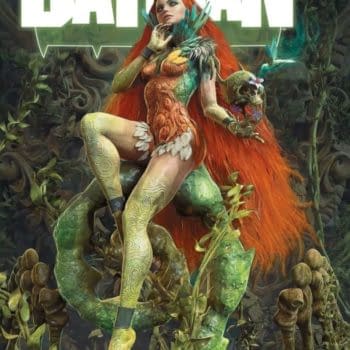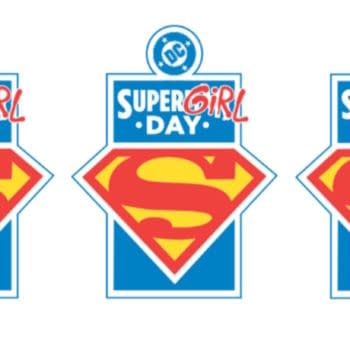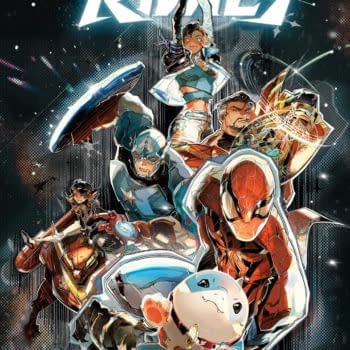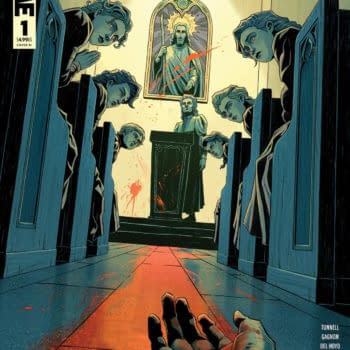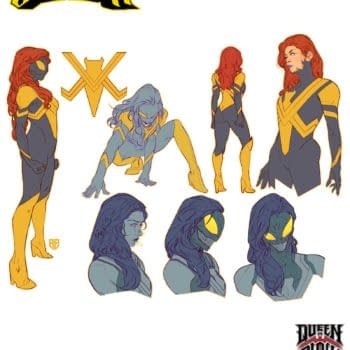Posted in: Comics | Tagged: Comics, entertainment
"Comics Could Do A Better Job" – Talking To Image Comics Publisher Eric Stephenson About Sales, Creators, Loot Crate And Image Day

Rich: I bought Youngblood #1 when it came out. I think you did as well, Eric. Image are publishing comics by people who weren't born then. What difference do you see in comic book creators who didn't know a time when there wasn't an Image Comics?
Eric: I think the big difference is that creator-owned comics are a viable option, as opposed to something creators have to struggle for. Creator-owned comics are a normal part of the business now, and there are fewer and fewer writers and artists who seem especially surprised by the fact we do what we do here at Image.
Rich: Twenty-five years before Image was founded, Jack Kirby was still writing and drawing Fantastic Four. That's the same span between then and the foundation of Image Comics and between that and now. Have you seen as many changes for the opportunities of comic book creators in the second timespan as you did the first?
Eric: Well, look at it this way: When Jim Valentino first called me up around the end of 1991 and asked what I thought about him, Rob, Todd, Erik, Marc, Jim, and Whilce getting together to start their own company, I wanted to break into comics, but my options were pretty limited. It was pretty much work-for-hire or self-publish at that point in time, because the smaller publishers that did do creator-owned material weren't really bringing on loads of new books. As a result, I think the majority of aspiring comics writers and artists were thinking about which established characters they wanted to work on, as opposed to how to create new work, whereas as you say, today the talent pool has grown up with Image and other creator-owned publishers. That alone is a pretty significant development, but beyond that, writers, artists, colorists, and letterers are generally paid better than they've ever been paid, plus some of the things offered as compensations to anyone doing work-for-hire — royalties, exclusives — are greatly improved over years' past.
Rich: How do you think the Image founders would have reacted if you could have shown them a 2017 Image back then?
Eric: I suppose that depends on the founder, really, but if I had to hazard a guess, I'd say favorably. When Image was first starting, Valentino and I talked a lot about what he envisioned for the company, and you know, he came from an indie comics background, so he was talking about Image bringing in that type of talent. That being the case, I think Image looks very much like he hoped it would — a diverse group of talent doing books that appeal to every type of reader. I know from talking to Todd over the years that he's very proud of the fact that the creators who've come along since the beginning do things their own way — when he spoke at Image Expo a couple years back, he likened it to "passing the torch," and honestly, I'd be surprised if all the founders didn't look at it that way. It was never their intention to create a homogenized slate of books that were nearly indistiguishable from one another — they invited other people to join them at Image because they wanted everyone to enjoy the same freedom they had. If you look at some of the earliest non-founder series Image published — Sam Kieth's The Maxx probably being the best example — Image could be whatever the individual creators wanted. People sometimes forget that Jeff Smith published Bone through Image for a while in the mid-'90s — everyone was thrilled to have that in the line-up. If you look at the best work over the history of the company — and remember Warren Ellis produced a lot of visionary work through WildStorm when Jim Lee was still at Image, things like Planetary, Stormwatch, and The Authority; Alan Moore did 1963 and Supreme, Kurt Busiek started Astro City here, Joe Madureira did Battle Chasers, Matt Wagner was doing Mage — it doesn't look all that different from what we're doing now.
Rich: Everyone has a "Day" now it seems. I blame Free Comic Book Day. Now we have Batman Day. Aliens Day. C-Day for Crossed. What can we expect from today – Image Day?
Eric: The great thing about Image Comics Day is that the actual date of our 25th anniversary fell on a Wednesday, on new comics day, this year, so it seemed like a great opportunity to partner with some stores to celebrate who we are, what we do, and all the great talent we work with. To that end, we have invited our retailer partners to celebrate with us, with over 40 stores hosting in-store events across the U.S., in Canada, in Australia, in Ireland, and in the U.K. on Wednesday, February 1. Nearly 100 creators are participating, so it's going to be a big day for anyone interested in meeting the creative minds behind their favorite Image books. In addition to all that, we're sending out some promo materials specific to the event, including window clings, a guide to some of Image's top titles, a poster, bookmarks, and of course, we're going to have a week's worth of new comics on the stands, including the first of our 25th anniversary tribute variants, and the 25¢ issue of The Walking Dead.
Rich: There's all but a million Walking Dead #163 on comic book shelves today. How different do you see this sampling/promotional activity compared to the Loot Crate Walking Dead comic?
Eric: Bottom line, we're aiming to get people into comic book stores with this. I already said this when we announced our pre-orders on The Walking Dead #163, but we're not making any money off this, nor is Robert. On paper, it's going to look like a very big hit, but it's going to be a hit in the same sense "Blue Monday" by New Order was a hit — the more copies are ordered, the more money we lose. But we're fine with that, because the whole reason we're doing this is to have an awesome comic book in stores on Image Comics Day, something well-known, something that is starting at the beginning of a new arc at the same time the television show is coming back with the second part of Season 7, and it's pocket change to buy in. Are we guaranteed to get feet through the doors of every comics store in every city? Well, obviously not, but that's the goal — to get more people into stores. I'm not sure including an issue of a comic in a box filled with other stuff necessarily drives retail support the same way. Loot Crate seems to have a very large customer base — that's how you get some of these launch books going in there and debuting at number one in the top 100 on the back of 500,000 comics distributed through that channel — but it's not like those customers are choosing those books, and the fact of the matter is that if you track sales on the comics included in Loot Crate, it's a pretty steep drop after #1. In the worst cases, the first issue debuts at #1 on the sales charts and then it's off to oblivion. I'm not sure how that's a benefit to anyone at all, unless all you care about is chart placement and market share, and the reality of the situation is that comics included in Loot Crate boxes are not part of the market.
Rich: So, there are a quarter of a million or more Walking Dead #163s in comic book stores on Image Day. Loot Crate subscribers got their Walking Dead a few years ago in that box, whether they wanted it or not. Aside from the 25 cent price, which should make every adult current comic book store customer want to pick it up – maybe that's 150,000 if I'm being generous – how exactly are you planning to get other people in who, frankly, don't read any monthly comics right now? Is there something you're not telling us about tomorrow? About what is actually in this issue of the Walking Dead that might see another half a million decide to check it out? Donald Trump zombie? The first appearance of Darryl? Michonne's conception?
Rich: Bleeding Cool put you at the top of the Top 100 Power List this year, something I know you disagreed with. My argument was that you seem to be a tastemaker for the industry. Your decisions, which creators you choose to publish through Image has a major effect on bigger publishers, who have seen many of their mainstays drawn away, or at least split between you. And everyone has to offer more favourable deals in order to compete. Greg Capullo taking time off of Batman to do Reborn seems to have worked out very well for him on his return. And equally the kinds books that Image now finds itself publishing, have seen new companies establishing themselves with work that wouldn't seem out of place with Image now, but would have seemed very out of place with the industry 25 years ago. Given that analysis, given the importance your actions make to the industry, the life changing effects a book at Image can make for comic book creators – do you ever feel under pressure beyond the remit of your job when making such publishing choices?
Eric: We probably have different views on what my job actually is, so that undoubtedly plays a large part in why we don't agree on this, Rich. Not that it's a big deal or anything — your list is fun, and hopefully most people who look at it each year appreciate it in that spirit. But you know, my pain point of divergence with you on all this is that I primarily view myself as the custodian of this really awesome idea set into motion by the Image Founders. Nothing I do here would be possible without them, and without the creators we work with. Over the years, creators have thanked me, and I never quite get it. I mean, I understand the intent behind what they're saying, but they're the ones doing the work, and they're publishing that work on a platform constructed by the founders of the company. As you say, who we work with and what we publish often has a ripple effect on other publishers, so it's like we're putting on a big show — but I just work the curtains. Image has a magnificent group of people here in the office — our hard-working production staff, our accounting team, our sales and marketing crew — and it's them and the creators we publish who deserve all the credit. That said, of course, I feel pressure, not just when I'm making publishing choices, but whenever I hire someone for our staff, or make a decision about something that's going to affect one of our books. I hardly think that's specific to me, though. We're all part of the same industry, and everything we do affects the overall balance of the business.
Rich: Admittedly if I had written the Power List before recent events, I may have just had to elevate Ike Perlmutter. We are moving from a President who was a comic book fan to a President who seeks political advice, friendship and a role in his administration from the CEO of Marvel Comics. How do you interpret this recent chain of events, can you see an impact on comic books and is there any chance you'll be moving Image Comics (again) to Canada? Todd might approve…
Eric: You know, I actually just spent some time in Victoria, up on Vancouver Island in British Columbia, and that's a place I really love. Montreal and Toronto are both pretty great, too, so you know, if the Canadian government wanted to make it worth our while to move up there, that would be worth pretty serious consideration at this point. All kidding aside, though, I love where I live. Though fundamentally flawed at present, the United States is a great place. I was in the U.K. on Election Day, and yeah, it was depressing to wake up to the relaity of a Trump presidency, but I don't think you change anything by running away. You look at the Women's March events that followed the inauguration — something like one in one hundred of all United States citizens participated in those events, nationwide. If those people stay committed to fighting back, and if they make an effort to participate in the voting process, that's how you change things. A lot of people focus on the fact that Hillary Clinton won the popular vote by more than three million votes, but a less popular statistic is that just about half of eligible voters didn't vote at all. If you're not going to participate in the policitical process, then sure, go somewhere else, but if you want to enact positive change, this is the time and the place to do it. In terms of comics, well… History has shown that World War II, the Cold War, the Civil Rights Movement, and the Culture Wars of the late '60s / early '70s all had long-lasting effects on comics, at least on a creative level, so I have no doubt that what's happening today will influence creators, as well.
Rich: It's Image's 25th year. It's going to be your ninth as Publisher as Image. You've talked about overtaking Marvel and/or DC in sales. Is Image, as a publisher, succeeding at doing what it needs to do, to get that far? And are you continuing in the right direction in your mission to achieve that status?
Eric: You tell me!
I look at the five years since our 20th anniversary as incredibly positive, but I'm here and I'm obviously going to be biased. I think we do some wonderful things, some of which are successful, some of which aren't. I'm not the decider on how this is all perceived, you know? But I do think comics have changed over the last five years — the comics being produced, the people reading them, the people selling them. It's a process that will continue, and everyone here at Image is excited to be part of that. We could all be doing more, though, beause as of right now, comics still look more or less like the comics I grew up with. That was back in the 1970s. This is 2017. For comics to really thrive, we all need to take Steve Jobs' famous advice and "think different." That's certainly my goal in this new year, and I think that will keep us on the path we need to follow if we're going to achieve those bigger goals you mentioned.
Rich: As well as changing a creator's career with a successful Image comic, I have also heard talk of creators at Image who feel they get stuck in a never-never land. Working on a comic for Image that doesn't sell well enough to keep their heads above water, yet they feel unable to cancel it and Image Comics are happy to keep it going. So they end up taking a very long nose dive, when possibly they could have parachuted out at the beginning. We've seen SEX move from comic format to original graphic novels. Is this going to be a more common solution at Image going forward?
Eric: Maybe? There are different solutions for the same problems sometimes. Not everything works across the board. Sometimes canceling is probably a better option, and the notion that we're happy to keep something going when it's not successful isn't 100% accurate. Everything happens for a reason, even if it's prolonging the life of a comic that isn't doing particularly well. Both Robert and I have talked about this before, and before The Walking Dead and Invincible became hits, several of his books were pulled as soon as they seemed to be heading for the nose dive you're talking about. Not all creators want to do that, but like I say, sometimes it's best to pull the plug and move on to the next idea. Sometimes it's better to try another format. There's no one size fits all answer, really, because the reality of our marketplace, or any marketplace, is that not everything is going to be a success.
Rich: At Image Expo last year, saw the announcement of Creators for Creators, a new $30,000 grant to be awarded to a new creator or creative team for a project that Image Comics (and CFC partner, alternative press publisher Iron Circus Comics) will offer to publish when complete. Additionally that writers and artists of various Image titles will act as mentors to the recipients of the grant. Since then, we haven't heard about any grants being handed out. Is this still a going concern?
Eric: It is, and Creators For Creators will be announcing the first beneficiaries of the grant in March at the Emerald City Comicon.
Rich: What do you see as the greatest threat to the comic book industry from comic book publishers right now?
Eric: Complacency. Just doing the same things that have been done over and over again, hoping in vain for the same results. Like I said a minute ago, it's 2017. Why are we still so beholden to the 20th century for our ideas? I'm not even just talking about characters or genres, but the whole approach. Everything we do in comics right now is still more or less based on what what was happening in comics anywhere from half a century to 75 years ago, and there should be absolutely zero glory in that. If we want the comic book industry to continue to thrive as we dig deeper into this new century, then we're all going to have to work a little harder to change how we create, how we sell, how we market — everything. No one publisher is going to do it. It's something everyone needs to be actively focused on, because no matter what anyone thinks the comics marketplace looks like now, that's not what it's going to look like in 25 years.
Rich: Image Comics has often worked with the CBLDF – you publish their Liberty Annual, you host parties together at comic conventions and more. Can I ask your take on their decision to publish an official letter of support for Simon & Schuster over publish the work of Milo Yiannopoulos. It seemed a rather controversial one.
Eric: Well, protecting free speech can be controversial, especially when the views being protected aren't popular. The thing is, though, our First Amendment rights aren't restricted to the views we like — everyone is entitled to free speech. The Comic Book Legal Defense Fund's main purpose is to protect free speech, to uphold our First Amendment rights. Sometimes doing that is going to ruffle feathers on the right, and sometimes it's going to ruffle feathers on the left, but free speech is free speech, even when we don't like what is being said. That's one of the benefits of living in a free society, and honeslty, publishers like Simon & Schuster need everyone's support, because the minute we start curbing one point of view, we're on a very slippery slope that leads us to everything coming under scrutiny. And you know, supporting free speech isn't the same as agreeing with the content of the message. What's more, if you don't agree with the message, you can use your own voice to speak out against it. Barring that, you can always vote with your wallet.
Rich: And punching Nazis? Or, as Warren Ellis might have it, punching Nick Spencer?
Rich: So how's Portland suiting everyone? Reckon Image will still be there in 2042?
Eric: Portland is lovely and everyone seems to be settling in just fine, despite arriving just in time to get hit with the city's worst winter weather in nearly a decade. Portland has been incredibly welcoming, though, and I think everyone views it as a refreshing change to be part of such a tight-knit comics community. It's cool to be in a city that hosts its own comic convention again, and we're already looking at how we can expand our presence at Rose City Comic Con. Will Image be here in 25 years? I'll be 74 and long retired by that point, so who knows. It's certainly possible.
Retired? Right…
Image Day is tomorrow, with signings and sales in comic stores across the world, and Walking Dead #163 available for 25 cents.






